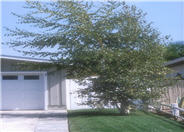
Common name:European White Birch
Botanical name:Betula pendula
This medium-size weeping tree will grow to about 40' tall and has a whitish-brown bark with deciduous green leaves.
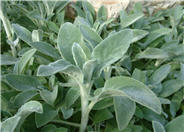
Common name:Lamb's Ear
Botanical name:Stachys byzantina
This tiny shrub will grow less than 1' tall and has medium-size, greyish-green leaves with blue and lavender flowers that bloom in the spring. This shrub is grown more for its velvety leaves than the flowers. It is drought tolerant once it's established. Be careful not to overwater.

Common name:Japanese Maple
Botanical name:Acer palmatum
This magnificient plant can used as a small tree or shrub. It is deciduous with graceful leaves which have a scarlet color in spring as it leafs out. Leaves later turn orange or yellow in fall. It is slow growing to 20', and requires shelter from the hot sun. The leaves of this tree are small, light green in color, and deeply lobed. It should also be noted that this tree remains spectacular throughout all seasons. (2nd photo courtesy of Steve Mullany)
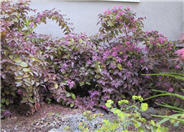
Common name:Red Fringe Flower cultivar
Botanical name:Loropetalum chinense v. rubrum
Red Fringe Flower is a shrub that grows 6'-12' tall and wide. It has arching branches with light green and reddish leaves. Pink flowers bloom intermittently throughout the year. This attractive shrub prefers afternoon shade and shelter from hot, drying winds. It needs a moderate amount of watering.
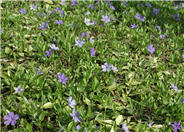
Common name:Dwarf Vinca or Periwinkle
Botanical name:Vinca minor
This groundcover will grow less than 1' tall and has small, glossy, dark green leaves with blue, purple, lavender, or white flowers that bloom in the spring.
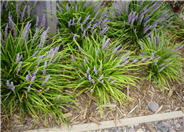
Common name:Lily Turf
Botanical name:Liriope muscari
Grass-like clumps of dark green leaves 1" wide up to 18" long are found on the Liriope muscari. It can reach a height of 12"-15", and dark blue flowers spikes can be seen held above the leaves during the summer. This is an excellent border, accent or ground cover plant that requires part shade exposure.
The natural world works in cycles. Everything is changing form and moving from place to place in an endless energy exchange system. The leaves and twigs that fall to the ground, not to mention other life forms that might die, decompose and combine with water, air and minerals of the soil to create a medium for future plants.
Click in the green box for more information
Designer:
Photographer: GardenSoft
Physical weed control, including mulching, or hand removal protects the watershed from harmful chemicals.
Remove irrigation water and fertilizer from areas where you don't want weeds to grow.